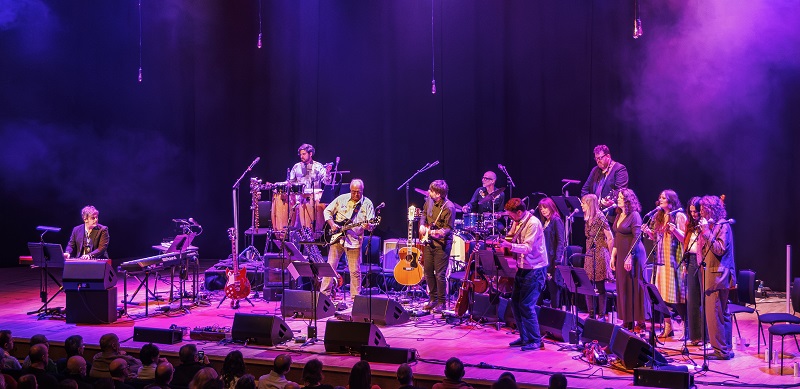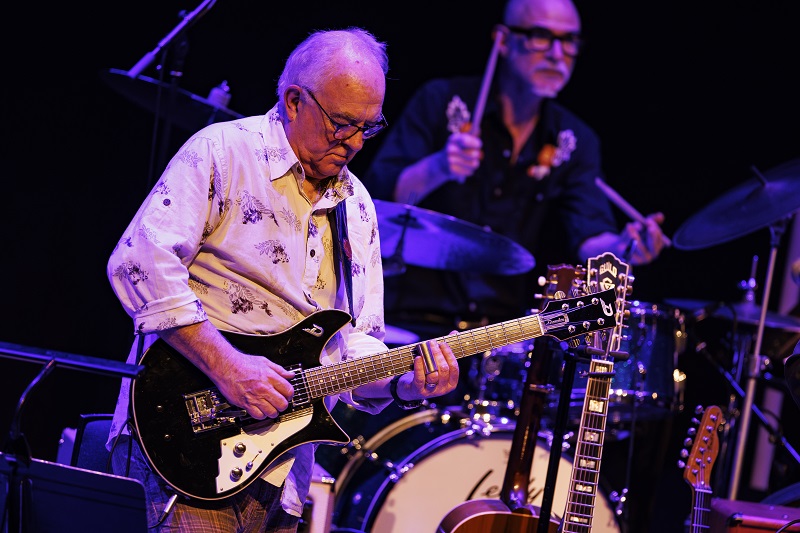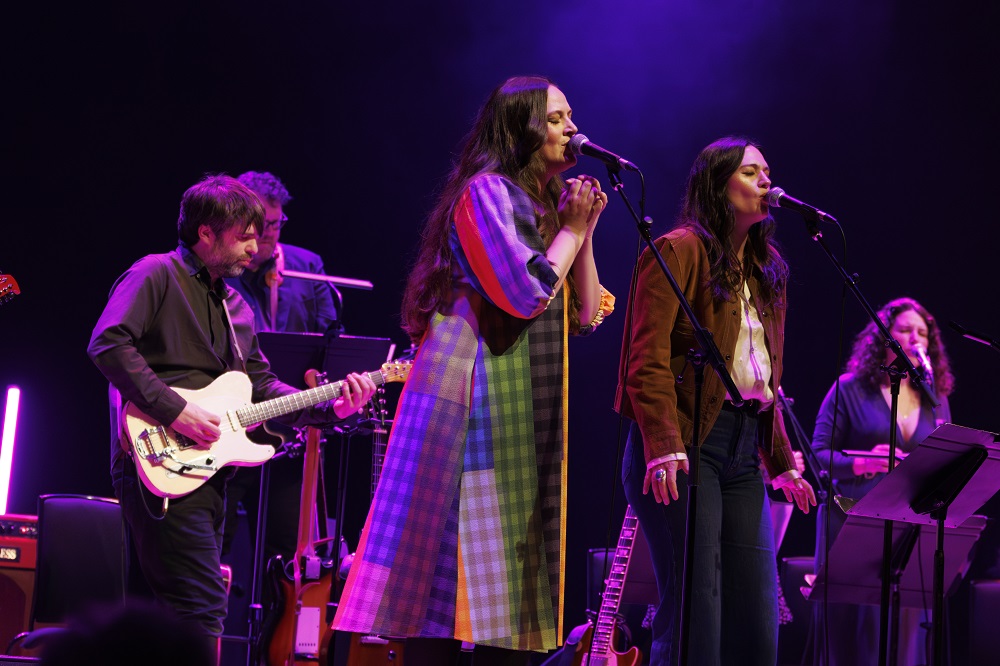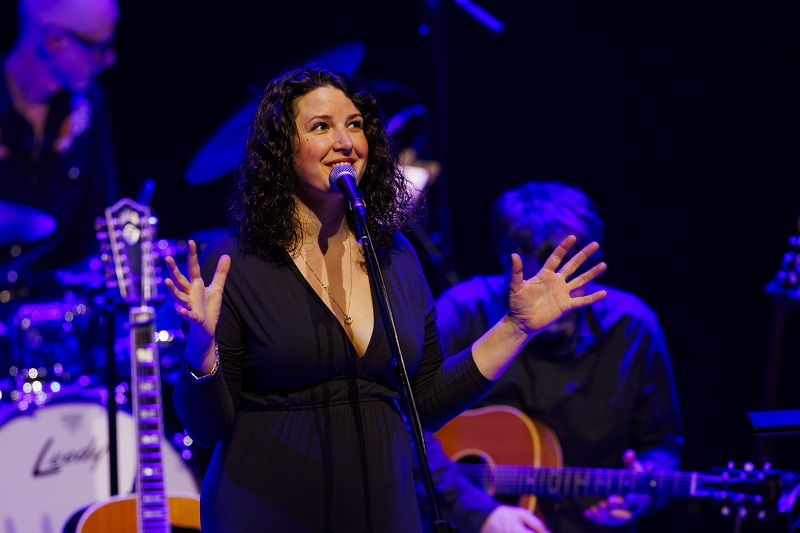
Two years, two weeks and a day – but hey, who’s counting? – since David Crosby died saw an ensemble gig at The Barbican to celebrate specifically his album ‘If I Could Only Remember My Name‘ and more generally the music of David Crosby. And that’s quite a legacy of music, a Byrd for the first five albums and the 1973 re-union disc with his songwriting contributions getting stronger as time went on. The all conquering debut albums by CSN and CSNY and the hardly unsuccessful – in sales terms at least – subsequent albums in the many permutations of those consonants. True, his solo output was at a slow pace, but the album that was being celebrated on this night is one of the truly great albums of the era and in the last years of his life he more than made up for lost time with album after album appearing as CSN became definitively a thing of the past. The songs often felt so personal to Crosby that one had to wonder if many, or even any, of them would ever be heard live again. Well, yes they would be and hopefully will be again – Liam Ó Maonlaí, who had a great night, declared that this band couldn’t be allowed to stop and he made a very good point.
This band, it turned out, was quite the ensemble – organised by Kate St. John it included Ed Harcourt, Margo Buchanan, Michelle Willis, Robbie McIntosh, Adam Chetwood, Evan Jenkins, Ben Nicholls, Ernesto Marichales, The Staves, Kris Drever and Liam Ó Maonlaí. The gig was split into halves, Crosby’s landmark debut solo album in total with a second side of songs drawn from his contributions to The Byrds, Crosby Stills & Nash (& Young) and beyond. It all got under way with ‘Music is Love‘ and if the high lead vocals by The Staves was strange at first it only took a few seconds for the ultimate hippy anthem to safely land. It’s an optimistic dream – it always was – but a seductive one.

Following up with ‘Laughing‘ – Crosby’s questioning of how to find the real meaning of life also served notice that whilst the whole album might be coming it wasn’t going to be in the original running order. It’s always seemed a well balanced album, but it was better to think of this as just The Barbican running order rather than some affront to a masterpiece. It could take it anyway – as ‘Tamalpais High (At About 3)‘ rang out with vocals pitched as instruments against an array of three guitars. And then, at last, the CSN&Y soap opera disguised as an outlaw tale, ‘Cowboy Movie‘ with Ed Harcourt on lead vocals – it’s a blissful trip, hitting all the highs and lows as the band of musical brothers find themselves torn apart by “the law” and with one of Crosby’s finest lines of self analysis “you know I’m crazy…but I ain’t real dumb.‘

It was, however, Liam Ó Maonlaí who came closest to embodying the spirit of Crosby, first on ‘What Are Their Names‘ a song introduced with the acknowledgement that “we know who Crosby would be singing this to” and it carried the song’s full finger-pointing force. With ‘Traction in the Rain‘ following rapidly on its heels that meant the first half would, like the original album, close out with a trio of exercises in vocal harmonies, and sure enough ‘Song With No Words (Tree With No Leaves)‘ was beautiful and floatingly jazzy in all it’s ethereal beauty and with the lights dimmed and the stage rear filling with smoke it wasn’t hard to imagine the woolly hatted head of Crosby nodding back there in approval. The cathedral city name recitation of ‘Orleans‘ came with a line-up of acoustic guitars and then a beautifully staged closing moment with ‘I’d Swear There Was Somebody Here‘ as the lights went down completely, the shiver of an absent presence passed through the room as Crosby’s requiem for Christine Hinton became a similar reflection for Crosby’s passing. Time to catch a breath.

The second half looked to other Crosby songs and launched with Kris Drever on the torch song ‘Everyone’s Been Burned‘, a very jazzy song from Crosby’s first big band, featuring some really cool congas – quickly followed by The Staves – introducing themselves as “a couple of birds singing The Byrds” – for the questioning ‘Why‘ which showed, despite Crosby’s later protestations, that McGuinn was right to grab a half-credit by changing the tone of the song with the simple swap out of “me” for “her“. Proto-raga rock, still timelessly funky, it carried its Sixties credentials lightly.
Margo Buchanan, who’d earn a “Happy Birthday” in honour of her seventieth, impressed mightily on ‘Long Time Comin’‘ – could the guitars have ripped loose a little bit harder? Well, maybe. The apocalyptic ‘Wooden Ships‘ became a little softer as The Staves made it a family affair singing ‘Take your sister by the hand‘. Continuing along the CSN&Y path, Liam Ó Maonlaí made an impassioned introduction to ‘Guinevere‘ commenting on the human need to both make music and to explore one’s inner life by way of framing how David Crosby could have pulled together this loving portrait of Christine Hinton, touched with the depth of sadness he felt at her loss. And then in complete contrast Ed Harcourt led the band home on a truly joyous outpouring of emotion on the counter-culture anthem ‘Almost Cut My Hair.‘ These are songs that felt they might be lost to us now, but they still carry some power.
Moving from the backing singer position to front of stage Michelle Willis spoke movingly of her eight or so years of recording with Crosby on his later solo albums – the true joy he found with playing with a new generation of musicians helps to make it clear that these were not secondary works but a real late flourishing. Her first lead vocal went, though, to the rather wonderful CPR song ‘Morrison‘ which allowed Crosby’s long-held beef with the lead singer of The Doors to live on. It’s a great song, but does convey quite clearly the disdain that Crosby held Jim Morrison in.

A duet on ‘The Things We Do For Love‘ was Crosby in a much mellower and more forgiving – and grateful – mood and the set closed out with the musing on the passage of time and how it can, at moments, be made to stop when one lives in the moment for real, and not just as a meditative aspiration – ‘Delta‘ is such a lovely timeless song.
The expectation that the encore would include ‘Deja Vu” surprisingly did not come to pass – just a single song and it was Michelle Willis on ‘Carry Me‘ from the Crosby-Nash album ‘Wind On The Water.’ Here Crosby had accepted that even death can be an acceptable next stage, when the time is right. A strange song for a man in his early thirties to write, but, apart from that missing ‘Deja Vu‘, a very fitting way to close a gig that had shown the many different musical faces of David Crosby. One can only hope that Liam Ó Maonlaí is right that this band will realise they are too good to permanently stop. This is, after all, the 60th anniversary of the release of ‘Mr. Tambourine Man’, the 55th anniversary of ‘Deja Vu‘, the 50th anniversary of ‘Wind On The Water,‘ the 21st anniversary of ‘Crosby & Nash‘…need we go on?



Oh my goodness…… SURELY this was recorded!!?? Filmed!!??
On the question of filming at least – sadly not, as far as I could see.